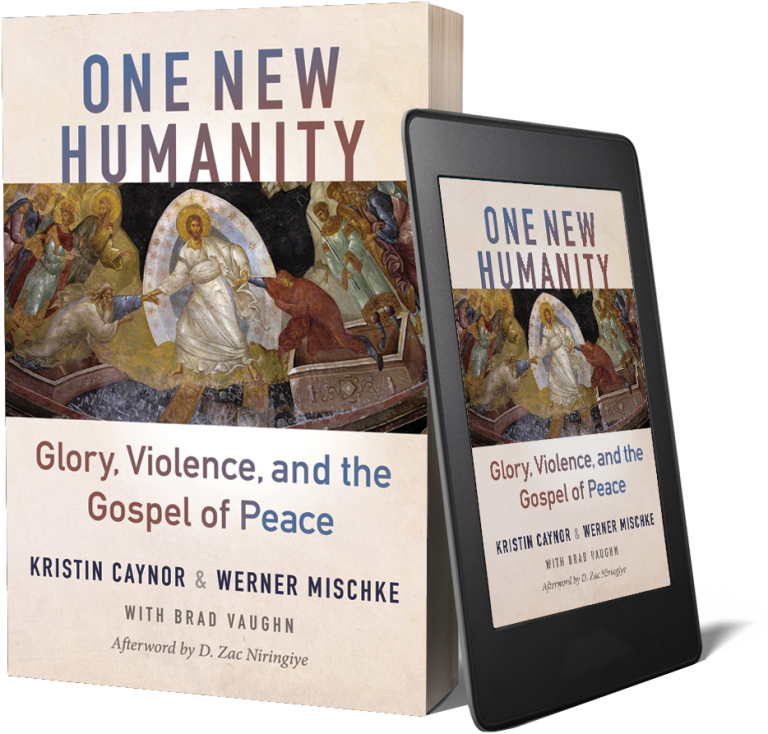Explore the book

Section I: GLORY and Shame
What does it mean to be human? Because of God our Creator, being human means that we are made in the image of God—imago Dei—“crowned with glory and honor” (Ps 8:6); this is humanity’s Original Glory, or “relational beauty.” Humanity’s longing for glory is according to God’s design, and Original Glory precedes Original Sin. This mosaic of glory-related truth—our Original Glory, our longing for glory by God’s design, Jesus our glory, and the loss of glory felt in shame—comprises the foundation for understanding the cycle of toxic shame and violence. It also helps us to see that while shame often leads to violence, it is fundamentally a healthy response to brokenness in the world, which can lead to transformation.
Chapter 1
The Longing for Glory
This chapter reexamines the biblical depth of the concept of glory as “relational beauty.” This glory described by Scripture is a deep human need and is far- reaching in its implications. God desires to share his own glory with us in Jesus.
This chapter reexamines the biblical depth of the concept of glory as “relational beauty.” This glory described by Scripture is a deep human need and is far- reaching in its implications. God desires to share his own glory with us in Jesus.
Chapter 2
Jesus Our Glory
This chapter explains that Jesus, the ideal human being, is simultaneously God’s glory and humanity’s glory—as revealed in the Gospels and in Pauline texts such as Ephesians 1 and 2.
This chapter explains that Jesus, the ideal human being, is simultaneously God’s glory and humanity’s glory—as revealed in the Gospels and in Pauline texts such as Ephesians 1 and 2.
Chapter 3
Defining (and Defending) Shame
This chapter explores how humanity’s sin-and-shame is properly understood and grieved against the backdrop of our Original Glory.
This chapter explores how humanity’s sin-and-shame is properly understood and grieved against the backdrop of our Original Glory.
Section II: VIOLENCE and Sin
What does it mean to be human? Because of sin, being human means that we often respond to problems with conflict. We live in a broken world plagued by the traumas of division, hostility, and violence. The Bible and the gospel speak to all the dynamics at the root of violence.
Chapter 4
Sin Is Not Simple
This chapter considers an overall biblical witness concerning sin as a personal, social, multigenerational, and systemic tangle of individual, corporate, and cosmic forces.
This chapter considers an overall biblical witness concerning sin as a personal, social, multigenerational, and systemic tangle of individual, corporate, and cosmic forces.
Chapter 5
Shame, Violence, Individualism
This chapter compares individualistic with collectivistic cultures, and examines the limits individualism places on how we respond to violence. We explore how these limits can be overcome.
This chapter compares individualistic with collectivistic cultures, and examines the limits individualism places on how we respond to violence. We explore how these limits can be overcome.
Chapter 6
Powers and Principalities
This chapter presents surprising findings on how Powers and Principalities were understood in the ancient world. This sheds new light on Ephesians’ four references to cosmic beings (1:21; 2:2; 3:10; 6:12), and on the implications for God’s people.
This chapter presents surprising findings on how Powers and Principalities were understood in the ancient world. This sheds new light on Ephesians’ four references to cosmic beings (1:21; 2:2; 3:10; 6:12), and on the implications for God’s people.
Chapter 7
Status Games
Humanity’s competition for status and recognition are major drivers of social hostility and international conflict, but in Ephesians 1–2, by the glory of being “in Christ” we embody a gospel that subverts traditional conflict-fueling beliefs about identity and status.
Humanity’s competition for status and recognition are major drivers of social hostility and international conflict, but in Ephesians 1–2, by the glory of being “in Christ” we embody a gospel that subverts traditional conflict-fueling beliefs about identity and status.
Chapter 8
Group vs Group Hostility
This chapter examines social science insights about group- based conflict, for example, the Law of Group Polarization and the Ethical Paradox of Group Loyalty; these contrast starkly with Christ’s gospel of peace and the depolarizing of Jews and gentiles embodied in Ephesians 2.
This chapter examines social science insights about group- based conflict, for example, the Law of Group Polarization and the Ethical Paradox of Group Loyalty; these contrast starkly with Christ’s gospel of peace and the depolarizing of Jews and gentiles embodied in Ephesians 2.
Section III: The GOSPEL OF PEACE and its King
What does it mean to be human? Because of Christ the True Human, being human means that God restores our humanity through saving us from sin, violence, and dehumanizing idolatries. Christ is our peace; Christ makes peace; Christ preaches peace (Eph 2:14, 15, 17). Being human means participating with Christ in proclaiming the gospel of peace for the world and to all peoples—near and far.
Chapter 9
Resurrection in Rwanda
This chapter recounts our experiences in Rwanda, and the way that our deepest longings for glory can be met through the cross, and in the most difficult places to forgive and find reconciliation.
This chapter recounts our experiences in Rwanda, and the way that our deepest longings for glory can be met through the cross, and in the most difficult places to forgive and find reconciliation.
Chapter 10
Pax Romana vs. Pax Christi: Contrasts in Peace
This chapter compares Rome’s imperial propaganda about global peace through conquest and dominance, with Christ’s peace through the humility of the cross, which subverts imperial notions of violence-based “peace.”
This chapter compares Rome’s imperial propaganda about global peace through conquest and dominance, with Christ’s peace through the humility of the cross, which subverts imperial notions of violence-based “peace.”
Chapter 11
Perfection in Weakness: Contrasts in Power
This chapter explores the complexities of Christianity in partnership with empire—“Pax Christiana.” Power is unavoidable, but humanity’s lust for power is often pathological; indeed, Pax Christiana is often complicit with violence, greed, and idolatry, contra Pax Christi and Ephesians 2.
This chapter explores the complexities of Christianity in partnership with empire—“Pax Christiana.” Power is unavoidable, but humanity’s lust for power is often pathological; indeed, Pax Christiana is often complicit with violence, greed, and idolatry, contra Pax Christi and Ephesians 2.
Chapter 12
Homogenous Unit Principle: What Peace?
Since the 1970s, the Homogenous Unit Principle has been at the crux of two global movements (Church Growth and Unreached Peoples). The HUP can be seen in continuity and in discontinuity with the Doctrine of Discovery and Dispensationalism, theologizing or reinforcing social division and racial inequality, contrary to Ephesians 2 and the gospel of peace.
Since the 1970s, the Homogenous Unit Principle has been at the crux of two global movements (Church Growth and Unreached Peoples). The HUP can be seen in continuity and in discontinuity with the Doctrine of Discovery and Dispensationalism, theologizing or reinforcing social division and racial inequality, contrary to Ephesians 2 and the gospel of peace.
Chapter 13
Being Human, and The Gospel
This chapter examines Jesus Christ as the True Human Being. What if our aim in being human is Jesus himself? What if the Sermon on the Mount was our guide for discipleship—including enemy-love and peacemaking? What if Christ Jesus preaches the gospel of peace? What if the gospel is primarily not about going to heaven, but about being truly human with King Jesus—for his kingdom on earth as it is in heaven?
This chapter examines Jesus Christ as the True Human Being. What if our aim in being human is Jesus himself? What if the Sermon on the Mount was our guide for discipleship—including enemy-love and peacemaking? What if Christ Jesus preaches the gospel of peace? What if the gospel is primarily not about going to heaven, but about being truly human with King Jesus—for his kingdom on earth as it is in heaven?
Chapter 14
Gospeling Peace with King Jesus
This chapter opens space to imagine practical ways of living out the Good News of Peace. It reflects on whether obeying the simple teachings of our Lord is the path to right belief and offers “four principles” plus “four provocations” on how churches can live more fully into one new humanity.
This chapter opens space to imagine practical ways of living out the Good News of Peace. It reflects on whether obeying the simple teachings of our Lord is the path to right belief and offers “four principles” plus “four provocations” on how churches can live more fully into one new humanity.
